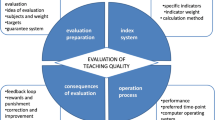Abstract
The purpose of this investigation was to apply a validated curriculum evaluation instrument, the Science Curriculum Implementation Questionnaire (SCIQ), in an educational context in which a science curriculum review had recently been completed and, by so doing, ascertain the accuracy and potential value of the instrument as a curriculum delivery evaluative tool. The study begins by exploring the themes generated from an extensive case study attempting to identify the broad and complex factors influencing science program delivery at a large urban intermediate (Years 7 and 8) school in New Zealand. Following this, the results of the subsequent application of the SCIQ in the case study school are discussed. Responses to the SCIQ reaffirmed the themes identified in the case study and, by way of standard deviation analysis, gave a similar description of the variability in the staff perceptions pertaining to the factors influencing science program delivery. Limitations and recent practical applications of the SCIQ are also discussed.
Similar content being viewed by others
References
Appleton, K., & Kindt, I. (1999). Why teach primary science? Influences on be-ginning teachers' practice. International Journal of Science Education, 21(2), 155-168.
Appleton, K., & Symington D. (1996). Changes in primary science: Implications for the research community. Research in Science Education, 26(3), 299-316.
Baker, R. (1994). Teaching science in schools: What knowledge do teacher's need? Research in Science Education, 24(3), 31-40.
Edmonds, G., & Lewthwaite, B. E. (2002). Science program delivery evaluation: A principal's journey in school self-review. In R. K. Coll <nt>(Ed.)</nt>, STERpapers 2002 (pp. 132-149). Hamilton, New Zealand: Centre for Science and Technology Education Research, Waikato University.
Fraser, B. J. (1994). Research on classroom and school climate. In D. Gabel <nt>(Ed.)</nt>, Handbook of research on science teaching and learning (pp. 493-541). New York: MacMillan.
Fraser, B. J. (1998). Science learning environments: Assessment, effects and determinants. In B. J. Fraser & K. G. Tobin <nt>(Eds.)</nt>, International handbook of science education (pp. 527-564). Dordrecht, The Netherlands: Kluwer.
Fraser, B. J., & Tobin, K. (1998). Qualitative and quantitative landscapes of class-room learning environments. In B. J. Fraser & K. G. Tobin <nt>(Eds.)</nt>, International handbook of science education (pp. 527-564). Dordrecht, The Netherlands: Kluwer Academic Publishers.
Fullan, M. (1992). Successful school improvement. Buckingham, UK: Open University Press.
Fullan, M. (1993). Changing forces: Probing the depths of educational reform. London: The Falmer Press.
Garden, R. A. <nt>(Ed.)</nt>. (1996). Science performance of New Zealand Form 2 and Form 3 students <nt>(Research and International Section)</nt>. Wellington, New Zealand: Ministry of Education.
Gay, L. R. (1996). Educational research: Competencies for accuracy and application. Upper Saddle River, NY: Prentice Hall.
Goodrum, D., Rennie, L., & Hackling, M. (2001). Science in Australian primary schools. Investigating, 17(4), 5-7.
Harlen, W. (1978). Does content matter in primary science? School Science Review, 5, 614-625.
Harlen, W. (1988). Teaching and learning primary science. London: Harper & Row.
Harlen, W. (1997). Primary teachers' understandings in science and its impact in the classroom. Research in Science Education, 27(3), 323-337.
Harlen, W., Holroyd, C., & Byrne, M. (1995). Confidence and understanding in teaching science and technology in primary schools. Edinburgh, UK: The Scottish Council for Research in Education.
Knight, G., & Meyer, D. (1996). Critical factors in the implementation of the new mathematics curriculum: A research report. Palmerston North, New Zealand: Massey University.
Lewthwaite, B. E. (2000a). Temporary or permanent changes: Training science teacher perceptions and reflections. In R. K. Coll <nt>(Ed.)</nt>, SAMEpapers 2001 (pp. 111-128). Hamilton, New Zealand: Centre for Science and Technology Education Research, Waikato University.
Lewthwaite, B. E. (2000b). Teaching primary science-how teachers see the problems. In G.Haisman<nt>(Ed.)</nt>, Exploring issues in science education (pp. 11-22). Wellington, New Zealand: Research & Curriculum Divisions, Ministry of Education.
Lewthwaite, B. E. (2001). The development, validation and application of a primary science school curriculum implementation questionnaire. Unpublished ScEdD Thesis, Curtin University, Perth, Australia.
Lewthwaite, B. E, Stableford, J., & Fisher, D. L. (2001). Enlarging the focus on primary science education in New Zealand. In R. K. Coll <nt>(Ed.)</nt>, SAMEpapers 2001 (pp. 213-237). Hamilton, New Zealand: Centre for Science and Technology Education Research, Waikato University.
Mullholland, J., & Wallace, J. (1996). Breaking the cycle: Preparing elementary teachers to teach science. Journal of Elementary Science Education, 8(1), 17-38.
Owens, R. G. (1995). Organisational behaviour in education. Boston: Allyn and Bacon.
Payne, K., & Lewthwaite, B. E. (2002). Systematic curriculum review: A procedure for analysis. New Zealand Principal-Te Temuaki O Aotearoa, 18(2), 30-33.
Stewart, T., & Prebble, T. (1985). Making it happen: A school development process. Palmerston North, New Zealand: Dunmore Press.
Stewart, D., & Prebble, T. (1993). The reflective principal: School development within a learning community. Palmerston North, New Zealand: ERDC Press.
Tilgner, P. G. (1990). Avoiding science in the elementary school. Science Education, 74(4), 421-431.
Weiss, I., Matti, M., & Smith, P. (1994). Report of the 1993 National Survey of Science and Mathematics Education. Chapel Hill, NC: Horizon Research.
Author information
Authors and Affiliations
Rights and permissions
About this article
Cite this article
Lewthwaite, B., Fisher, D. The Application of a Primary Science Delivery Evaluation Questionnaire. Research in Science Education 34, 55–70 (2004). https://doi.org/10.1023/B:RISE.0000020899.42419.1c
Issue Date:
DOI: https://doi.org/10.1023/B:RISE.0000020899.42419.1c




